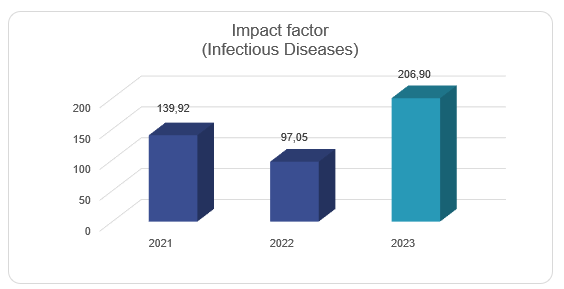Scientific report 2023 of the Infectious Diseases Working Party (IDWP)

Major achievements
Aim of the IDWP studies
In 2023, we came back to normal activity, leaving the focus on COVID-19 that centred our activity since 2020, resuming studies of other infectious complications. Nonetheless, we continued several studies on COVID-19 that have been the objective of several publications and communications in 2023 or have been sent for 2024 meetings.
Publications / communications
In 2023 we had 18 excellent publications (5 listed below), 7 oral presentations (one in the EBMT 2023 Presidential Symposium) and 3 posters.
New Registry
2023 was marked by a historic event: the successful launch of the New EBMT Registry on the 24th of August 2023. Like the rest of the WPs, we were involved in the development of the New Registry, collaborating in the review of the new forms (core dataset and the coming extended dataset). For the IDWP, the New Registry is a qualitative leap as it has, for the first time, specific questions for various complications of infections formulated in a closed manner (no free text). The previous forms were focused mainly on specific diseases and were more suitable for “vertical WPs” (those focused on diseases like leukaemia, lymphoma, and aplastic anaemia, for example) than for “horizontal” WPs like IDWP or TCWP. In MED A, we had very limited data: CMV serology for patient and donor in allo-HCT, no CMV serology is collected for auto-HCT; Infection as an item of the comorbidity index; Infection as a Contributory Cause of Death; as an indication for treatment of viral infection; as an indication for Treatment PTLD, EBV lymphoma. In MED-B, we had low-quality data, mainly free text with only a short list of 20 pathogens (bacteria, fungi, viruses, parasites). In the new core dataset, we collected information about viral, bacterial, fungi, and parasitic with an extended list of pathogens and localisation of the infection according to the CTCAE version 5. We know that these news forms represent an increase in the data that are collected compared to the previous ones, but they are necessary to give answers to the new challenges we have today with HCT and other forms of cell therapy. We will support data managers with manuals on how to fill the different fields, and we will monitor how the new fields are filled and if changes are required.
Way of running studies
Another change we need is the way we perform studies in the WP. Until now, it has been more or less the same; they are based on MED C to capture information that is not in PROMISE, using PDFs or Excel files. That is a time-consuming and expensive method of work that requires many hours from the IDWP team to pass the information to a database where we can finally analyse it. The hours required for data entry consume 60% of the IDWP budget. We have just launched (December 2023) a new study based on a new APP tool that we hope will accelerate and facilitate the capture of the needed data. At the EBMT level, this issue is also being studied to give a better solution for all the WPs studies.
Educational activities
An Educational Task Force has been created to coordinate and improve the different educational activities of the EBMT, including the WPs. The IDWP, like the other WPs, form part of this new task force that will contribute to improving the different educational activities of the WPs.
New IDWP Chair in 2024
Next April 2024, a new chair will be elected for the IDWP at the EBMT meeting in Glasgow. Although I have to say that for the IDWP, as for the rest of EBMT, these 4 years since 2020 have been very demanding with an unusual load of work, for me time has lapsed very quickly. I can’t believe that 4 years have passed. I have had the fortune to count on a fantastic IDWP team (Nina Knelange, Lotus Wendel, Inge Verheggen, Juan Schwartz, Gloria Tridello) and the outstanding support and active collaboration of many haematologists, microbiologists and ID specialists. Many people have contributed to this, and I’m afraid that if I named some, many will be unrecognised here. So please, my apologies for not naming all the good people who have collaborated during these 4 years. I have to express special thanks to the IDWP members, particularly Per Ljungman, Simone Cesaro, Jan Styczynski, Malgorzata Mikulska and José Luis Piñana, who have been part of all the SARS-CoV-2 studies and recommendations. Special thanks also to our previous EBMT President, Nicolaus Kroeger, Harry Dolstra (previous EBMT Treasurer), John Snowed (EBMT Secretary) and Isabel Sanchez (Medical Officer) for their unconditional support in everything related to the SARS-CoV-2 pandemic. Finally, let me express my gratitude to Dina Averbuch, the Secretary of the IDWP, during these 4 years. Without her help, initiative, commitment and organisation, all the IDWP work done during these years would have been difficult to achieve.

16 - 18 November 2023
Athens, Greece
Principal research studies
Key publications

| 2021 | 2022 | 2023 | |
|---|---|---|---|
| Oral presentations | 2 | 6 | 7 |
| Poster presentations | 2 | 7 | 3 |
| Educational events | 2 | 2 | 2 |



